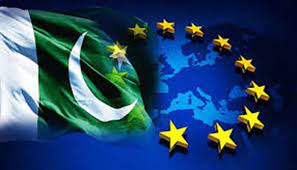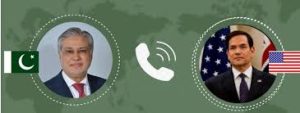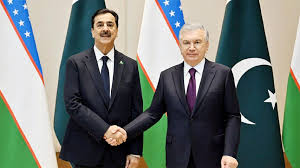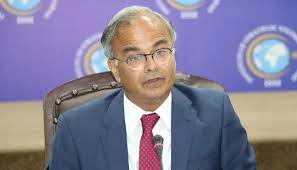EU-Pakistan joint commission held, cooperation to be enhanced

Islamabad: The European Union (EU)-Pakistan Joint Commission was held by video conference on June 16. The plenary of the Joint Commission was preceded by sub-group meetings on Development Cooperation (25 February 2021); Trade (2 March 2021); and Democracy, Governance, Rule of Law and Human Rights (1 June 2021).
The Joint Commission provided an opportunity to exchange views on all areas of cooperation between the EU and Pakistan. Pakistan underlined that the EU is a valued partner of Pakistan, being home to a large Pakistani diaspora, its biggest trading partner and a source for investment, remittances and economic assistance. The EU and Pakistan reiterated their commitment for the full and effective implementation of the EU–Pakistan Strategic Engagement Plan (SEP), signed in June 2019.
The Joint Commission discussed the socio-economic impact of the COVID-19 pandemic. The humanitarian assistance provided by the European Union was highly appreciated. The ongoing vaccination programmes and future cooperation in vaccines were also discussed. Pakistan’s efforts for sustainable economic recovery were also highlighted.
They also exchanged views on climate change, where the EU informed Pakistan about the European Green Deal, connectivity and digitalisation, and Pakistan briefed about various climate projects, including eco-system restoration, green stimulus and national electric vehicle policy. They also discussed cooperation in the fields of education, culture, science and technology. The Joint Commission also provided an opportunity to discuss migration and mobility and to follow up on the discussions of the EU-Pakistan Joint Readmission Committee, which was held on 24 February 2021.
The EU and Pakistan agreed to enhance bilateral trade, including by addressing issues that are hampering trade and investment, improving the business climate, and Pakistan’s efforts towards full implementation of the 27 international conventions stipulated under the EU’s unilateral trade preferences scheme, the Generalised Scheme of Preferences Plus (GSP+). Pakistan acknowledged the extension of its GSP+ status as a mutually rewarding step and affirmed its full commitment to fulfil its obligations under the GSP+. Pakistan underlined the relevant measures and actions taken since September last year.
On development cooperation, the EU and Pakistan appreciated encouraging progress. Pakistan appreciated the EU’s decision to re-orient its development assistance to support Pakistan’s efforts to tackle effects of the COVID-19 pandemic. The Joint Commission also exchanged views on priorities of future development cooperation.
Joint efforts in the fields of democracy, governance, rule of law and human rights, cooperation on human rights issues at international fora, and the promotion and protection of all fundamental freedoms were discussed. Both the EU and Pakistan reaffirmed their commitment to the promotion and protection of all human rights and fundamental freedoms, including freedom of religion and belief (including concerns about anti-Muslim hatred), the rights of persons belonging to minorities, freedom of expression, women’s rights and children’s rights. Pakistan informed about developments concerning the Journalist Protection Bill, the Forced, Involuntary Disappearance Bill and the Anti-Torture Law.
The EU raised concerns regarding death penalty and the abuse of blasphemy laws.
The EU welcomed the progress made by Pakistan in the implementation of the Financial Action Task Force (FATF) Action Plan and Pakistan’s commitment to continue the engagement with the FATF to address all the remaining issues.
While recalling the joint declaration on Afghanistan during the 5th session of the Pakistan-EU Strategic Dialogue, the EU and Pakistan reaffirmed their strong support for an Afghan-led and Afghan-owned peace process and encouraged the parties to the conflict to resume negotiations in earnest to achieve lasting peace and stability in Afghanistan. The achievements of the last 20 years in socio-economic development, human rights and fundamental freedoms should be preserved. The EU and Pakistan, therefore, call on the parties to observe a lasting humanitarian ceasefire, in response to the global appeal by UN Secretary General Guterres, and to strive towards a complete elimination of violence as a clear demonstration of their genuine commitment to lasting peace and reconciliation.
The EU appreciated Pakistan’s hosting of millions of Afghan refugees for past two decades. The EU assured Pakistan of its cooperation and ongoing work towards a durable solution, including through assisting and promoting the safe and dignified return of Afghan refugees to their homeland. In this regard, the EU and Pakistan emphasised the need for a well-resourced and time-bound roadmap.
Pakistan briefed the EU on the recent developments in the region and reiterated its concerns regarding the human rights and humanitarian situation in Indian controlled part of Jammu and Kashmir. The EU welcomed the recent reiteration by Pakistan and India to fully implement the 2003 Ceasefire Understanding along the Line of Control and encouraged more confidence-building measures between Pakistan and India.
The EU expressed its readiness to support regional integration and sustainable connectivity in the South Asia region.
The Joint Commission was co-chaired by Mr Gunnar Wiegand, Managing Director for Asia and the Pacific in the European External Action Service, and Mr Noor Ahmed, Secretary of Economic Affairs Division. Representatives of relevant Ministries of the Government of Pakistan as well as of the European Commission, the Ambassador of the EU to Pakistan, Pakistan’s Ambassador to the EU and observers from EU Member States also participated in the meeting.
It was agreed to hold the next session of the Joint Commission in Islamabad in 2022.





